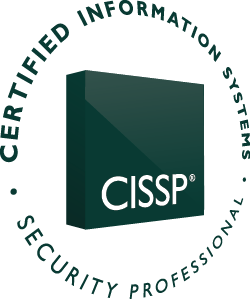Globally recognized, CISSP is a leading certification for professionals developing policies and procedures in information security. A CISSP is an information assurance professional who defines the architecture, design, management and/or controls that assure the security of business environments.The vast breadth of knowledge and the experience it takes to pass the exam is what sets a CISSP apart. The credential demonstrates a globally recognized level of competence provided by the (ISC)2® CBK®, which covers critical topics in security today, including cloud computing, mobile security, application development security, risk management and more.Ultimately, demonstrating a working knowledge of information security.
THE TEN DOMAINS OF SECURITY COVERED IN CLASS:
Access Control a collection of mechanisms that work together to create a security architecture to protect the assets of the information system.
- Concepts/methodologies/techniques
- Effectiveness
- Attacks
Telecommunications and Network Security discusses network structures, transmission methods, transport formats and security measures used to provide availability, integrity and confidentiality.
- Network architecture and design
- Communication channels
- Network components
- Network attacks
Information Security Governance and Risk Management the identification of an organization’s information assets and the development, documentation and implementation of policies, standards, procedures and guidelines.
- Security governance and policy
- Information classification/ownership
- Contractual agreements and procurement processes
- Risk management concepts
- Personnel security
- Security education, training and awareness
- Certification and accreditation
Software Development Security refers to the controls that are included within systems and applications Software and the steps used in their development.
- Systems development life cycle (SDLC)
- Application environment and security controls
- Effectiveness of application security
Cryptography the principles, means and methods of disguising information to ensure its integrity, Confidentiality and authenticity.
- Encryption concepts
- Digital signatures
- Cryptanalytic attacks
- Public Key Infrastructure (PKI)
- Information hiding alternatives
Security Architecture and Design contains the concepts, principles, structures and standards used to design, implement, monitor, and secure, operating systems, equipment, networks, applications, and those controls used to enforce various levels of confidentiality, integrity and availability.Fundamental concepts of security models.
- Capabilities of information systems (e.g. memory protection, virtualization)
- Countermeasure principles
- Vulnerabilities and threats (e.g. cloud computing, aggregation, data flow control)
Operations Security used to identify the controls over hardware, media and the operators with access privileges to any of these resources.
- Resource protection
- Incident response
- Attack prevention and response
- Patch and vulnerability management
Business Continuity and Disaster Recovery Planning addresses the preservation of the business in the face of major disruptions to normal business operations.
- Business impact analysis
- Recovery strategy
- Disaster recovery process
- Provide training
Legal, Regulations, Investigations and Compliance – addresses computer crime laws and regulations; the investigative measures and techniques which can be used to determine if a crime has been committed and methods to gather evidence.
- Legal issues
- Investigations
- Forensic procedures
- Compliance requirements/procedures
AND THERE’S MORE PERKS WITH THE CLASS:
- Award-Winning Instructor
- Instructor Certified in What They Teach
- Instructor Who Is a Practitioner – Bringing Expertise and Real-World Experience to Classroom
- Customized Courseware in Electronic and Hard Copy Forms
- Practice Tests
- Certificate of Completion
- Certification Endorsement Upon Passing Exam to Achieve CISSP Credential
- Lunch Every Day
- Snacks and Coffee Breaks for Duration of Training
- Instructor Availability
- Lifetime Membership to Hacker University
- Reduced Rates on Parameter Security’s Services
- Complimentary Pass to the Two Day ShowMeCon Conference
- Access to Conference Welcome Reception & After Parties
- And More
COURSE PREREQUISITES & ASSUMPTIONS:
This is a straight boot camp/certification prep and the exam voucher and exam are NOT included. Students shall arrange and pay for test at a later date via (ISC)² or PearsonVue. We would be happy to assist you if needed.
- You possess 5 years of direct full-time professional security work experience in two or more of the ten domains of the (ISC)²® CISSP CBK®
- Or 4 years of direct full-time professional security work experience in two or more of the ten domains of the CISSP pass4sure CBK with a college degree
- Alternatively, there is a one-year waiver of the professional experience requirement for holding an additional credential on the (ISC)2 approved list
- If you do not have the required experience, you may still take the course, sit for the exam and become an Associate of (ISC)² until you have gained the required experience

